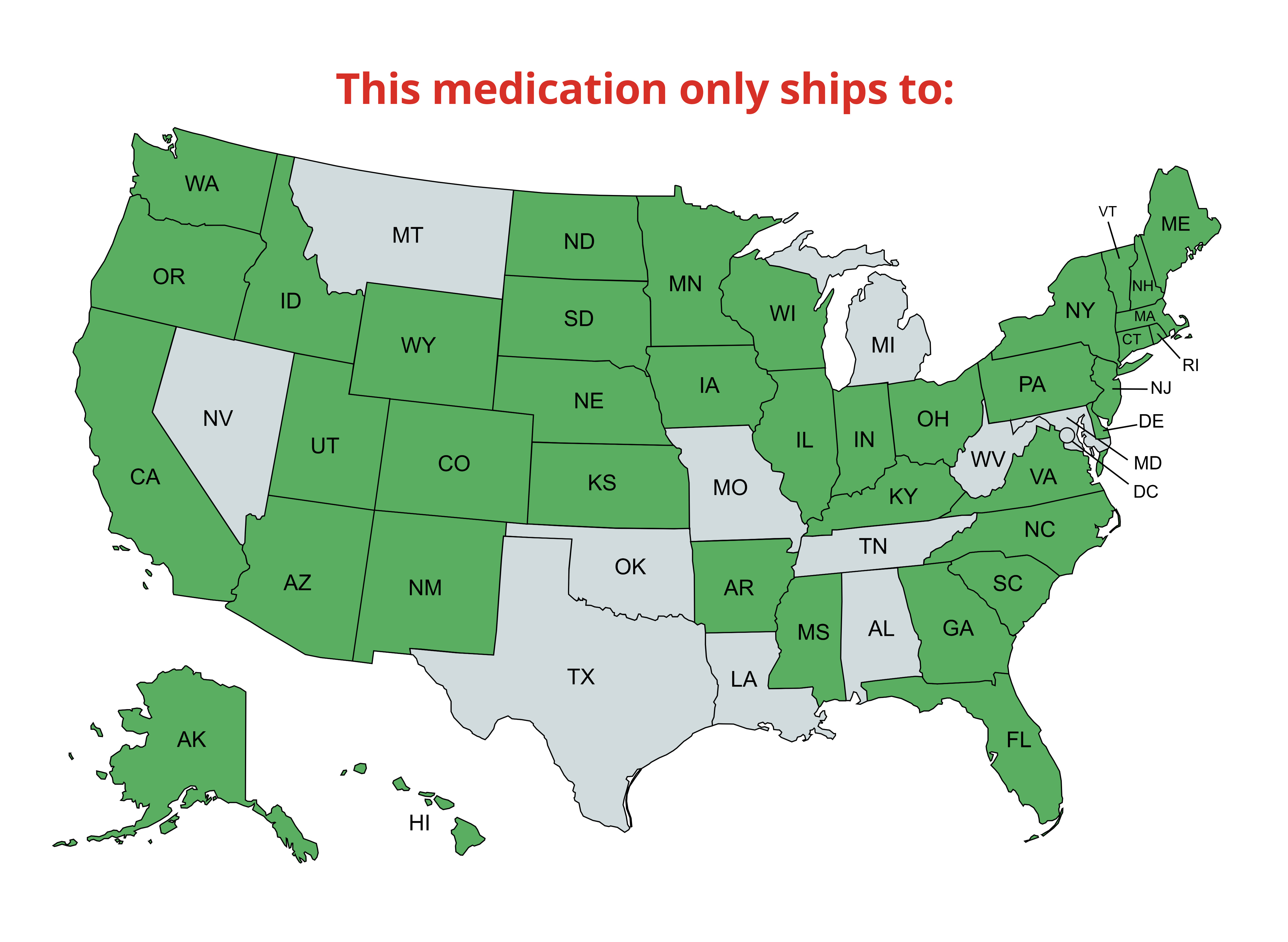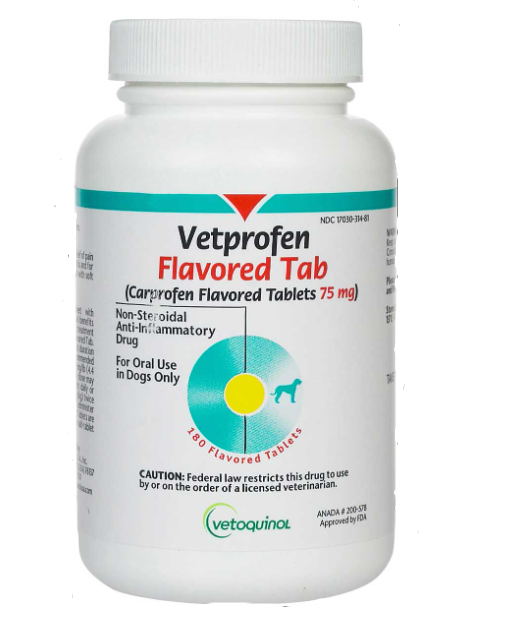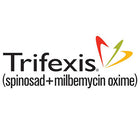
Vetprofen (Carprofen) 25mg Flavored Tablets
Vetprofen is a medication that requires a prescription and has carprofen as its active ingredient, which is a nonsteroidal anti-inflammatory drug (NSAID). It operates by inhibiting specific chemicals in the body known as prostaglandins that lead to inflammation. Carprofen is frequently utilized to alleviate joint pain and inflammation linked to arthritis and to aid in enhancing mobility in elderly dogs. It is also utilized for pain control following surgery or injury. If your dog has been diagnosed with a joint issue like arthritis or is struggling with limited mobility due to joint pain, your vet might recommend a medication like Vetprofen, an NSAID.
- Manages pain and inflammation caused by arthritis and joint conditions.
- Typically used for managing pain related to hip dysplasia.
- Lower a dog's body temperature
- Reduces postoperative pain and swelling.
- NSAID for canines with anti-inflammatory properties
- Beef flavored for convenient ingestion
Indications:
Vetprofen Flavored Tab is indicated for the relief of pain and inflammation associated with osteoarthritis and for the control of postoperative pain associated with soft tissue and orthopedic surgeries in dogs.
Prescription items are NON-RETURNABLE and NON-REFUNDABLE.
Please note product may arrive in a Hardy Paw Pharmacy vial, manufacturer packaging is shown for reference.
Dosage and Administration
Always provide the Client Information Sheet with prescription. Carefully consider the potential benefits and risks of Vetprofen Flavored Tab and other treatment options before deciding to use Vetprofen Flavored Tab. Use the lowest effective dose for the shortest duration consistent with individual response. The recommended dosage for oral administration to dogs is 2 mg/lb (4.4 mg/kg) of body weight daily. The total daily dose may be administered as 2 mg/lb of body weight once daily or divided and administered as 1 mg/lb (2.2 mg/kg) twice daily. For the control of postoperative pain, administer approximately 2 hours before the procedure. Tablets are scored and dosage should be calculated in half-caplet increments.
Cautions:
Federal law restricts this drug to use by or on the order of a licensed veterinarian.
Contraindications:
Vetprofen Flavored Tab should not be used in dogs exhibiting previous hypersensitivity to carprofen.
Warnings:
Keep out of reach of children. Not for human use. Consult a physician in cases of accidental ingestion by humans. For use in dogs only. Do not use it in cats.
All dogs should undergo a thorough history and physical examination before initiating NSAID therapy. Appropriate laboratory tests to establish hematological and serum biochemical baseline data before, and periodically during, administration of any NSAID should be considered. Owners should be advised to observe for signs of potential drug toxicity (see Information for Dog Owners, Adverse Reactions, Animal Safety and Post-Approval Experience).
Precautions:
As a class, cyclooxygenase-inhibitory NSAIDs may be associated with gastrointestinal, renal, and hepatic toxicity. Effects may result from decreased prostaglandin production and inhibition of the cyclooxygenase, which is responsible for the formation of prostaglandins from arachidonic acid. When NSAIDs inhibit prostaglandins that cause inflammation they may also inhibit those prostaglandins which maintain normal homeostatic function. These anti-prostaglandin effects may result in clinically significant disease in patients with underlying or pre-existing disease more often than in healthy patients. NSAID therapy could unmask occult disease which has previously been undiagnosed due to the absence of apparent clinical signs. Patients with underlying renal disease, for example, may experience exacerbation or decompensation of their renal disease while on NSAID therapy. The use of parenteral fluids during surgery should be considered to reduce the potential risk of renal complications when using NSAIDs perioperatively.
Carprofen is an NSAID, and as with others in that class, adverse reactions may occur with its use. The most frequently reported effects have been gastrointestinal signs. Events involving suspected renal, hematologic, neurologic, dermatologic, and hepatic effects have also been reported. Patients at greatest risk for renal toxicity are those who are dehydrated, on concomitant diuretic therapy, or those with renal, cardiovascular, and/or hepatic dysfunction. Concurrent administration of potentially nephrotoxic drugs should be approached cautiously, with appropriate monitoring. Concomitant use of Vetprofen Flavored Tab with other anti-inflammatory drugs, such as other NSAIDs or corticosteroids, should be avoided because of the potential increase of adverse reactions, including gastrointestinal ulcerations and/or perforations. Sensitivity to drug-associated adverse reactions varies with the individual patient. Dogs that have experienced adverse reactions from one NSAID may experience adverse reactions from another NSAID. Vetprofen Flavored Tab treatment was not associated with renal toxicity or gastrointestinal ulceration in well-controlled safety studies of up to ten times the dose in healthy dogs.
Vetprofen Flavored Tab is not recommended for use in dogs with bleeding disorders (e.g., Von Willebrand’s disease), as safety has not been established in dogs with these disorders. The safe use of Vetprofen Flavored Tab in animals less than 6 weeks of age, pregnant dogs, dogs used for breeding purposes, or in lactating bitches has not been established. Studies to determine the activity of Vetprofen Flavored Tab when administered concomitantly with other protein-bound or similarly metabolized drugs have not been conducted. Drug compatibility should be monitored closely in patients requiring additional therapy. Such drugs commonly used include cardiac, anticonvulsant, and behavioral medications. It has been suggested that treatment with carprofen may reduce the level of inhalant anesthetics needed.
If additional pain medication is warranted after administration of the total daily dose of Vetprofen Flavored Tab, alternative analgesia should be considered. The use of another NSAID is not recommended. Consider appropriate washout times when switching from one NSAID to another or when switching from corticosteroid use to NSAID use.
Information for Dog Owners:
Vetprofen Flavored Tab, like other drugs of its class, is not free from adverse reactions. Owners should be advised of the potential for adverse reactions and be informed of the clinical signs associated with drug intolerance. Adverse reactions may include decreased appetite, vomiting, diarrhea, dark or tarry stools, increased water consumption, increased urination, pale gums due to anemia, yellowing of gums, skin or white of the eye due to jaundice, lethargy, incoordination, seizure, or behavioral changes. Serious adverse reactions associated with this drug class can occur without warning and in rare situations result in death (see Adverse Reactions). Owners should be advised to discontinue Vetprofen Flavored Tab therapy and contact their veterinarian immediately if signs of intolerance are observed. The vast majority of patients with drug-related adverse reactions have recovered when the signs are recognized, the drug is withdrawn, and veterinary care, if appropriate, is initiated. Owners should be advised of the importance of periodic follow-up for all dogs during the administration of any NSAID.
FAQ
- What is Vetprofen?
- Vetprofen is an NSAID medication used to decrease pain and inflammation caused by osteoarthritis and postoperative pain in dogs. Vetprofen is a medication that requires a prescription for administration to dogs. The medication comes in tablet form and is administered orally to dogs.
- Osteoarthritis (OA) in dogs is a painful condition that occurs due to the wearing down of cartilage and other joint components, leading to various changes or indicators.
- Limping or having a disability in movement
- Reduced movement or physical activity (hesitation to get up, ascend steps, leap or sprint, or challenges in carrying out these tasks)
- Joint stiffness or limited joint mobility
- Your veterinarian may give your dog Vetprofen Flavored Tab to manage surgical pain and suggest continuing the treatment for a few days post-procedure.
- What are the possible side effects of vetprofen for dogs during therapy?
- Vetprofen, along with other medications, can result in certain side effects. Serious adverse effects have been documented in dogs treated with NSAIDs, such as carprofen, although they are uncommon. Severe adverse reactions may manifest unexpectedly and occasionally lead to fatal outcomes in rare cases.
- Stomach issues like bleeding ulcers, as well as liver or kidney problems, are typically the main side effects associated with NSAIDs. Search for the following potential side effects that could suggest that your dog is experiencing issues with Vetprofen or possibly another medical condition:
- Reduction or boost in appetite.
- Throwing up
- Alterations in bowel habits (such as loose stools, or dark, tarry, or bloody feces)
- Alteration in conduct (like reduced or heightened level of activity, lack of coordination, convulsions or hostility)
- The yellowing of the gums, skin, or whites of the eyes is known as jaundice.
- Adjustments in the patterns of alcohol consumption (such as how often and how much is consumed)
- Alteration in the way one urinates (frequency, color, or odor)
- If you believe your dog is experiencing a medical issue or adverse reaction to Vetprofen therapy, it is crucial to discontinue treatment and promptly get in touch with your veterinarian. If you have any further inquiries regarding potential side effects, consult with your vet.
- What is vetprofen for dogs dosage?
- Follow the dosage instructions provided by your vet when administering Vetprofen. Your vet will inform you of the appropriate dosage of Vetprofen for your dog and the duration of treatment. Vetprofen can be administered orally and can be taken with or without food.
- Who should avoid taking Vetprofen?
- Do not administer Vetprofen to your dog if:
- Has experienced an allergic response to carprofen, which is the main component of Vetprofen.
- Has experienced an allergic response to aspirin or other NSAIDs (like deracoxib, etodolac, firocoxib, meloxicam, phenylbutazone, or tepoxalin) such as hives, facial swelling, or red or itchy skin.
- What results should I anticipate when my dog is taking Vetprofen?
- Although Vetprofen does not cure osteoarthritis, it can alleviate the pain and inflammation associated with OA and enhance your dog's ability to move.
- Different dogs may have different responses, ranging from subtle to extremely dramatic.
- Most dogs will show signs of improvement within a few days.
- If you stop using Vetprofen or do not follow the instructions, your dog's pain and inflammation could return.
- Carprofen vs Vetprofen
- Carprofen and Vetprofen are essentially the same medication, both containing the active ingredient carprofen. Carprofen is the generic name, while Vetprofen is a brand name for the same drug. They are both nonsteroidal anti-inflammatory drugs (NSAIDs) commonly used in dogs to relieve pain and inflammation associated with conditions like arthritis. The choice between them often comes down to availability and personal preference, as they have the same active ingredient and similar effectiveness.
Recommended for the Vetprofen (Carprofen) 75mg Flavored Tablets
Product title
Vendor
$19.99 | $24.99
Product title
Vendor
$19.99 | $24.99
Product title
Vendor
$19.99 | $24.99
Product title
Vendor










